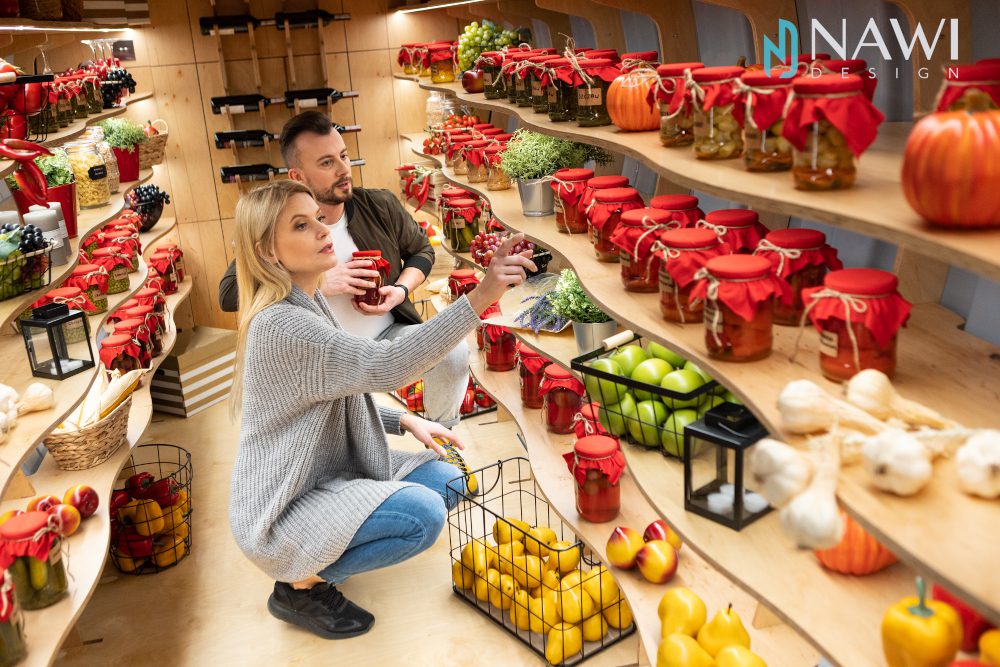
Introduction to Effective Use of Space in the Garden Basement
Garden basements and root cellars are not only a charming addition to any home but also a practical solution for storing a variety of items. In times of limited living space, the optimal use of these areas becomes crucial for efficient organization of living space. A well-organized basement or root cellar not only increases storage space but can also help better protect items and increase home safety.
What to Store in the Garden Basement?
Food and Wine – Ideal Storage Conditions
Basements and root cellars, thanks to their natural insulating properties, offer ideal conditions for storing food, especially those that require cool and dark conditions. Root vegetables such as potatoes, carrots, beets, or onions can be stored for months while retaining their freshness and nutritional values. Basements are also ideal for storing homemade preserves such as jars of jams and pickles.
When it comes to wine, the cellar provides ideal conditions for aging. Constant, low temperatures and limited light are crucial for the proper maturation of wine and the preservation of its bouquet. A well-designed wine cellar can be not only practical but also an elegant addition to the home.
Garden Tools and Seasonal Equipment
Garden basements are also an excellent place to store garden tools, seasonal equipment such as lawnmowers, shovels, rakes, or garden maintenance equipment. It’s important that tools are clean and dry before storage to prevent corrosion and extend their lifespan. Storing tools in the basement or root cellar protects them from extreme weather conditions and allows easy access when needed.
What Should Be Avoided When Storing in the Garden Basement?
Flammable Materials and Chemicals
Safety in the basement and root cellar is a top priority. Storing flammable materials such as paints, solvents, or fuels can pose a serious fire and health risk. These substances, if stored under improper conditions, can emit fumes that are not only harmful but can also create a dangerous environment. Therefore, it is recommended to store such materials in dedicated, well-ventilated, and safe storage areas away from the home.
Electronics and Sensitive Items
Moisture and temperature fluctuations, typical for basements and root cellars, can be harmful to electronics and sensitive items. Cameras, computers, televisions, or musical instruments are particularly susceptible to such conditions. Moisture can lead to corrosion and damage to internal components, while temperature fluctuations can cause condensation and further damage. Therefore, it is recommended to store these items in a controlled environment, ideally in a dry and stable place in the house.
Efficient Storage of Seasonal Decorations and Equipment
Basements and root cellars are ideal for storing seasonal decorations, such as Christmas ornaments or summer equipment. Storing these items in a place that is not accessible on a daily basis helps keep the house orderly. However, it is important that everything is properly secured – decorations in boxes and equipment protected from moisture.
Tips for Effective Organization of Space in the Garden Basement
Maximizing Space and Maintaining Order
Good organization is key to maximizing the use of basement space. Using shelves, hooks, boxes, and containers allows for efficient space utilization and facilitates access to stored items. Organizing items by category or frequency of use can significantly simplify life and avoid clutter. Regular reviews and tidying of the space are crucial to prevent the accumulation of unnecessary items and maintain the clarity of organization.
Good Practices in Maintaining the Basement
Proper maintenance of the basement and root cellar is as important as their organization. Regular ventilation helps maintain proper air circulation and prevents the accumulation of moisture. Controlling humidity is critical, especially when storing food and wine. It is also important to regularly check the condition of walls, ceilings, and floors for moisture, mold, or damage. If necessary, appropriate measures should be taken, such as sealing the basement or using anti-mold agents.
Using the Basement as Additional Living Space
Although the primary purpose of a basement is storage, with the right approach, it can be transformed into additional living space. Converting the basement into a recreation room, workshop, home office, or even a small gym is becoming increasingly popular. It is important that such an adaptation is well thought out and meets all safety and comfort requirements.
Summary: Key Points for Optimal Use of the Garden Basement
Keeping these tips in mind, your finished garden basement or root cellar will become not only a safe but also an efficient storage space. From proper organization, through safe storage, to regular maintenance – every aspect is important for the optimal use of this valuable space. Thus, the garden basement becomes not only a functional but also a safe extension of your home, which can bring many benefits.